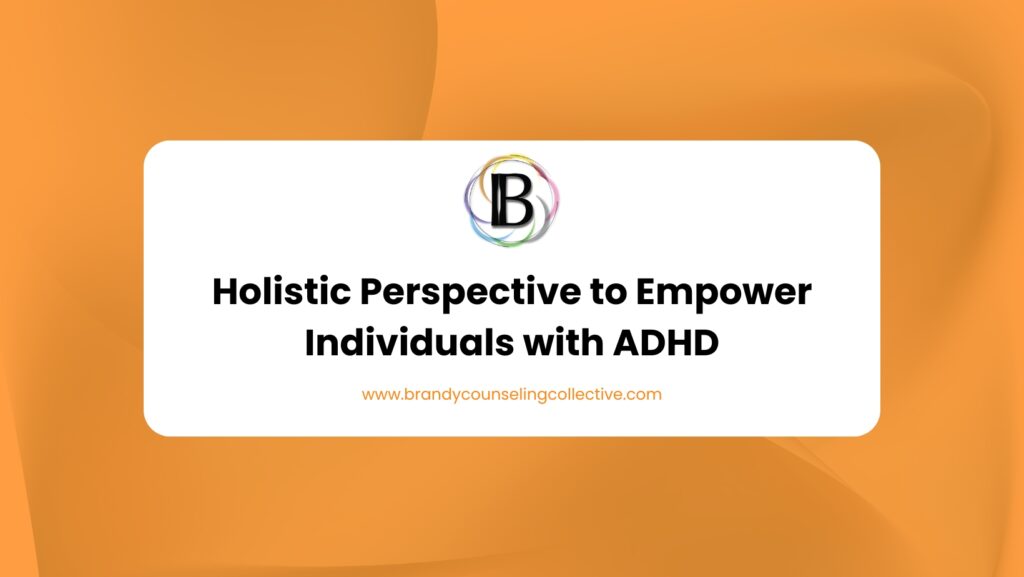Attention Deficit Hyperactivity Disorder (ADHD) is a neurodevelopmental disorder that affects millions of children and adults worldwide. Characterized by symptoms such as inattention, hyperactivity, and impulsivity, ADHD can significantly impact daily life, academic performance, and interpersonal relationships. While traditional treatments like medication and behavioral therapy are commonly used, a holistic perspective offers a comprehensive approach that addresses the whole person, enhancing overall well-being and empowering individuals to thrive.
Understanding ADHD Holistically
A holistic approach to ADHD considers the interconnectedness of the mind, body, and environment. This perspective recognizes that ADHD affects multiple aspects of an individual’s life and seeks to balance and optimize all these areas to improve overall functioning and quality of life. Holistic ADHD empowerment focuses on integrating various strategies to support individuals with ADHD effectively.
Nutrition and Diet
Nutrition plays a crucial role in brain health and can significantly influence ADHD symptoms. Adopting a balanced and nutritious diet can help manage and reduce symptoms.
Balanced Diet
A diet rich in fruits, vegetables, whole grains, and lean proteins provides essential nutrients that support brain health and overall well-being. These foods can help stabilize blood sugar levels, reducing mood swings and hyperactivity, which are common ADHD challenges.
Omega-3 Fatty Acids
Found in fish, flaxseed, and walnuts, omega-3 fatty acids are crucial for brain function and development. Studies have shown that these healthy fats can improve attention and reduce hyperactivity and impulsivity in individuals with ADHD.
Avoiding Artificial Additives
Some research suggests that artificial colors, flavors, and preservatives can exacerbate ADHD symptoms. Opting for natural, whole foods and avoiding processed foods can help mitigate these effects.
Stable Blood Sugar Levels
Consuming regular, balanced meals with a focus on low glycemic index foods can help maintain steady energy levels and improve concentration. Avoiding sugary snacks and drinks can prevent blood sugar spikes and crashes that can worsen ADHD symptoms.
Physical Activity
Regular physical activity is beneficial for everyone but can be particularly effective for managing ADHD symptoms. Exercise helps improve focus, reduce anxiety, and increase the levels of dopamine, norepinephrine, and serotonin in the brain, which are often lower in individuals with ADHD.
- Aerobic Exercise: Activities such as running, swimming, and cycling can help regulate mood and improve attention. Aerobic exercise has been shown to enhance cognitive function and reduce impulsivity.
- Yoga and Mindfulness: Combining physical movement with mindfulness practices can enhance self-regulation and reduce stress. Yoga, in particular, has been found to improve attention and reduce hyperactivity in children with ADHD.
- Outdoor Play: For children, unstructured outdoor play can improve attention spans and reduce hyperactivity. Spending time in nature can have a calming effect and provide sensory input that can help regulate the nervous system.
Mindfulness and Meditation
Mindfulness and meditation practices can be powerful tools for individuals with ADHD. These practices encourage present-moment awareness and help develop better attention control and emotional regulation.
- Mindfulness Meditation: Techniques such as focusing on the breath, body scanning, and mindful walking can help individuals with ADHD improve their ability to concentrate and manage stress.
- Mindfulness-Based Cognitive Therapy (MBCT): This approach combines mindfulness practices with cognitive-behavioral techniques to help individuals become more aware of their thoughts and feelings and develop healthier responses to stress.
Behavioral Strategies
Implementing effective behavioral strategies can help individuals with ADHD manage their symptoms and improve their daily functioning.
- Routine and Structure: Establishing a consistent daily routine can help individuals with ADHD manage their time and tasks more effectively. Visual schedules and checklists can provide clear expectations and reduce overwhelm.
- Positive Reinforcement: Using positive reinforcement to encourage desired behaviors can be very effective. Reward systems and praise can motivate individuals with ADHD to stay on task and complete activities.
- Time Management Techniques: Strategies such as breaking tasks into smaller steps, using timers, and setting specific goals can help individuals with ADHD manage their time and stay organized.
Environmental Modifications
Creating an environment that supports individuals with ADHD can significantly improve their ability to focus and function effectively.
- Minimizing Distractions: Reducing clutter and minimizing noise and visual distractions in the home or workplace can help individuals with ADHD maintain concentration.
- Sensory-Friendly Spaces: Designing spaces that accommodate sensory sensitivities, such as using soft lighting, providing quiet areas, and incorporating calming sensory inputs, can help individuals with ADHD feel more comfortable and focused.
Social and Emotional Support
Building a strong support network is essential for individuals with ADHD. Emotional and social support can enhance self-esteem, provide encouragement, and offer practical assistance.
Support Groups
Joining ADHD support groups can provide individuals and their families with a sense of community and shared experiences. These groups offer a platform to exchange tips, share challenges, and celebrate successes.
Therapy and Counseling
Working with a therapist or counselor who specializes in ADHD can help individuals develop coping strategies, improve self-awareness, and address any co-occurring mental health issues such as anxiety or depression. Cognitive Behavioral Therapy (CBT) is particularly effective in helping individuals with ADHD develop problem-solving skills and emotional regulation.
Family Education and Support
Educating family members about ADHD and involving them in the treatment process can enhance understanding and cooperation. Family support is crucial in creating a positive and supportive home environment.
Integrative Therapies
In addition to traditional treatments, integrative therapies can provide additional support for managing ADHD symptoms.
- Chiropractic Care: Some individuals with ADHD have found relief through chiropractic adjustments that focus on improving nervous system function.
- Acupuncture: This ancient practice can help regulate the body’s energy flow and reduce symptoms such as anxiety and hyperactivity.
- Herbal Supplements: Certain herbs, such as ginkgo biloba and ginseng, have been studied for their potential benefits in improving cognitive function and reducing ADHD symptoms. It is important to consult with a healthcare provider before starting any supplement regimen.
Balancing Traditional and Holistic Treatments
While a holistic ADHD approach is valuable, it is important to integrate it with traditional treatments to achieve the best outcomes. ADHD medication, such as stimulant medication, can be effective in managing symptoms for many individuals. However, it is essential to consider potential side effects and work with healthcare professionals to find the right balance.
A holistic perspective to empower individuals with ADHD involves addressing the physical, emotional, mental, and environmental aspects of their lives. By adopting a comprehensive approach that includes proper nutrition, regular physical activity, mindfulness practices, effective behavioral strategies, supportive environments, and social and emotional support, individuals with ADHD can improve their overall well-being and thrive.
Embracing a holistic approach not only helps manage ADHD symptoms but also enhances the quality of life for individuals and their families, promoting a balanced and fulfilling life. This holistic ADHD treatment offers a path to long-term well-being, empowering people with ADHD to reach their full potential.
Embrace a Holistic Approach to ADHD Empowerment with Brandy Counseling Collective
Are you or a loved one seeking a comprehensive, holistic approach to managing ADHD? Brandy Counseling Collective is here to help you thrive by addressing the physical, emotional, mental, and environmental aspects of well-being. Our expert team offers personalized strategies that encompass nutrition, physical activity, mindfulness, and more to empower individuals with ADHD.
Take the first step towards a balanced and fulfilling life. Contact Brandy Counseling Collective today to learn more and schedule a consultation.


